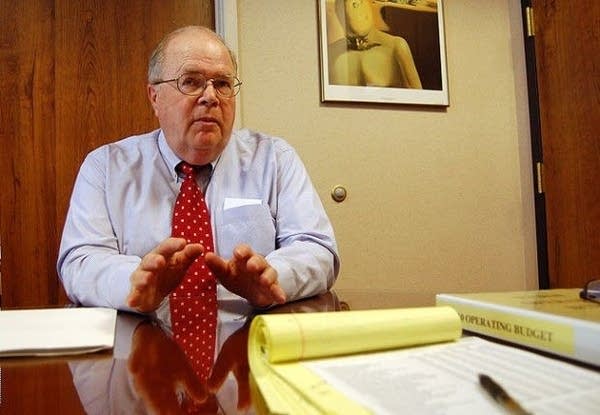Winona paper, student leader clash over MnSCU chief

Has the battle begun over the legacy of outgoing Chancellor James McCormick of the Minnesota State Colleges and Universities system?
In its May 14 editorial, "MnSCU's bureaucratic addiction is shameful," the Winona Daily News portrayed McCormick as a bureaucrat intent on protecting from scrutiny the bloated MnSCU empire he has created -- an empire whose expense has driven up student costs.
But coming to McCormick's side was perhaps an unlikely ally: Andrew Spaeth, chairman of the Minnesota State University Student Association, which represents students at MnSCU's four-year institutions.
His message: Blame the legislature for higher tuition. McCormick has worked to bring costs down.
Create a More Connected Minnesota
MPR News is your trusted resource for the news you need. With your support, MPR News brings accessible, courageous journalism and authentic conversation to everyone - free of paywalls and barriers. Your gift makes a difference.
Earlier this month, the paper used as ammo McCormick's recent rejection of a legislative proposal to study the efficiency of MnSCU:
McCormick objected to the House's version because of provisions that would have cast a critical eye at the bloated bureaucracy of the central offices in St. Paul.
McCormick reasoned that just because the Office of Legislative Auditor completed a study last year that another one, considering things like executive compensation, was unnecessary.
It's more than a little telling that McCormick is fine with budget changes, just as long as lawmakers don't look at his office or his fellow bureaucrats.
While McCormick characterized the OLA report as largely positive, the same report asked some important questions about the bureaucratic structure that still haven't been answered.
Among those questions:
Why does MNSCU's central office organizational chart run more than 40 pages? Why does MnSCU need more than 30 locations across the state? And why are executive salaries justified both at the campus and system level?
(Side note: The efficiency study seems to have been the idea of DFL representatives Gene Pelowski of Winona and Jeanne Poppe of Austin. Pelowski has been critical of MnSCU during recent higher-education committee hearings.)
The paper doesn't pull punches, calling McCormick a bureaucrat who has shown a "brilliant display of narrow-sightedness." MnSCU, meanwhile, suffers from an "arcane administrative structure," and is a "bureaucratic boa constrictor that seems bent on strangling students at the expense of layers of redundant administration."
But in a reply to the editorial, student leader Spaeth wrote that decreased state spending on higher education has caused tuition to rise -- something partly true -- and that McCormick has worked to cut bureaucracy, not increase it:
"I believe that McCormick has taken significant steps toward reducing administrative costs across the system. In fact, the number of college and university presidents has decreased by one-third during his tenure as chancellor, and there have been numerous reductions in spending and personnel at the Office of the Chancellor, as well as significant efforts for campuses across the system to work together to be more efficient in meeting students' needs.
Finally, the assertion in the editorial that Chancellor McCormick has "sacrificed students for the sake of the central office" is simply not true. The statewide student associations work closely with McCormick, and I believe that he deeply cares about students in the MnSCU system.
He has always been open to hearing student feedback about the issues important to us, and has been an advocate not just for the system, but for the students attending all of our state's colleges and universities."